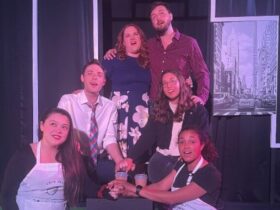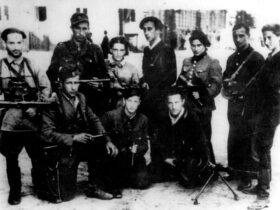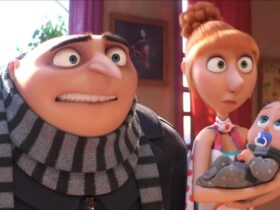 Hailing from Dublin, Ireland, Catherine Walker’s impressive body of work includes the fantasy-horror A Dark Song, the rom-com Leap Year, and the romance-drama Patrick’s Day. She has also appeared in many TV series, including The Clinic, Northanger Abbey, BitterSweet, Critical, and A Dark Song. More recently she appeared in the Netflix series Cursed.
Hailing from Dublin, Ireland, Catherine Walker’s impressive body of work includes the fantasy-horror A Dark Song, the rom-com Leap Year, and the romance-drama Patrick’s Day. She has also appeared in many TV series, including The Clinic, Northanger Abbey, BitterSweet, Critical, and A Dark Song. More recently she appeared in the Netflix series Cursed.
In The Curse Of Audrey Earnshaw, Walker is Agatha Earnshaw, the domineering mother of Audrey Earnshaw, an enigmatic young woman with a dark secret. They live as occultists on the outskirts of a remote Protestant village besieged by a pestilence of unknown origin: children, fields, and livestock begin to die — yet the Earnshaw farm remains strangely unaffected. In this one-on-one interview, Walker reveals her insights into the film and how she regards the craft and business of acting.
What attracted you to this film and the role of Agatha?
Catherine Walker: There was the supernatural and horror element but I loved the mother-daughter relationship. There’s something universal in that, the themes of taking care of your child, of overprotecting your offspring, and letting go. And almost being fearful of your child’s power in the world. I thought those relationships were fascinating. I imagined Agatha’s past. The minute I read the script, I felt that this woman had seen something that forced her to make really difficult, dark choices. And now she’s trying to hold on to that link, to control and live with that. We see what happens to her and we realize that it’s all she can do.

What did you draw from to portray that close mother-daughter relationship?
Walker: I don’t have children. But I’m at a time in my life where I get to explore that in my work. I drew on what it was to be a woman at that time and how hard you had to work to protect yourself, to fit in your own power. There was something very female about it, that it’s a film about two women.

Did you audition for the role? If so, what was that like?
Walker: I didn’t. Tommy (Thomas Robert Lee) had done a film a couple of years ago called Dark Song, which was similar in theme in how far a mother will go, what someone will do when they solidify something within themselves in order to protect it. Tommy loved that film and the character, so he asked me to do this film. They were incredibly loyal to me because originally the film was going to shot in Ireland but that changed to Canada and I was doing a Netflix series at the time. But they made it work. I flew back and forth. So I wanted to honor what they let me do by working my hardest on this film.

In immersing yourself in the role of Agatha, had you looked into the occult and its various quasi-religious aspects?
Walker: I had a bit, but this was the third time I’ve worked in this genre and I find it easier to connect to something inside myself, rather than an external idea of it. I find that to be stronger, more human, and more terrifying. I can understand that we can make a pact with the dark side—on different levels. It’s a battle within us all.

As the film progresses, the Agatha-Audrey relationship grows increasingly tenuous. Was there a scene you favored in depicting that strained relationship?
Walker: I think we did them all together in one day. We were in this wonderful place where the house was ‘dressed.’ And I loved going through the domestic world with Audrey. It had those moments when I see this power I’ve created that I don’t think I can control and that I don’t know what that means for the world. I get the chills just watching those scenes. And that shows you how far Agatha will go. She can’t control her daughter who has become something that should not be unleashed. I loved the subtlety of that coming through, for example when I cut myself and Audrey licks the blood off my hand. And there’s something in her eyes, or when we’re down washing the blood off the floor. All that visceral stuff I thought was great to play.

What did you find most challenging about being in this film?
Walker: It’s always a challenge to sustain when you’re exploring those darker places; it puts a cloud over you. So you have to take care of yourself, the actors, and the people around you. This was Jessica’s (Reynolds) first film and she’s so amazing. But I felt this kind of overprotectiveness towards her. We were working in extreme temperatures for our night shoots, and you don’t have to act when that’s happening (laughs). But the fighting scenes were physically tough when you’re being hit and pushed. But we had a brilliant stunt team and we had stricter regulations. I’m quite used to throwing myself on the ground. But they really controlled those scenes.

The film has a number of emotionally powerful scenes. Which is your favorite?
Walker: I loved the scene where Agatha is taking Audrey in the cart through the village and we get to see how the village sees her. As an actress, that was a really full thing to play—it’s her fear, her protection of her daughter. She’s in fight or flight mode. We were in this amazing place with me bringing this horse and cart on the road. In working with this great group of actors, we were in the moment. It was kind of an arriving moment for me in that she had to feel the weight of history that she had to deal with. She’s exhausted and beaten.
You’ve had major roles in quite a number of TV series. What do you like about TV compared to film?
Walker: That’s interesting. We’re in the golden age of television right now. I was classically trained in theater, which is where I began working. But I like working among the three mediums. When I finish one, I want to do the other. During this lockdown, I’ve really been drawn back to film. When television is just blowing up, I’m detaching a bit from myself from what I’m watching and being drawn back to the poetic-ness of film. The long form of television is wonderful for creating extended character arcs. But film is just more artistic.
What have you learned about this business that surprised you?
Walker: The most important thing I’ve learned is that the business is none of my business. I can’t control that. I can’t figure that out. As I get older, I let that do its thing and not try and work at what it is. I work on trying to be as creative as I can because the business isn’t necessarily creative. I often think when I do a job, I’m minding a candle flame and making sure it doesn’t go out. I used to think business and acting were more interlinked. The more I let go of the business, the more it comes. And it takes a while to learn that. I used to think that if I do this or that, I’d succeed. But there’s no formula, no predictor for success. And that’s what I’ve learned.
Many young actors look up to you. What advice would you give them to succeed in this business?
Walker: Stay creatively well. We need to look after the creativity and art. You need to be ready and not tire yourself out by worrying about the other stuff that’s not in your control. There are times when you’re just waiting. So use that time. I always say, I’m paid for the bits between acting; the acting I do for free. So when I walk on a set, I’m being paid for the weeks it took to prepare for the audition and the audition—for all those weeks without work. But the acting part, working with creative people—that’s the best job in the world.
Has The Curse Of Audrey Earnshaw whetted your appetite for more film work? Are there other film projects in the works for you?
Walker: I love working in that genre. I think you can tell really interesting stories because you’re working in extremes. You get to play characters that are challenged by the elements and their backs are against the wall with extreme emotion. Right now, I’m waiting for the next thing. Things may be a bit slow but I believe great things will come from this time. We’ll need film and television, plays, and stories to help us process what we’ve been through. Art is needed for what we can’t understand in ourselves.







